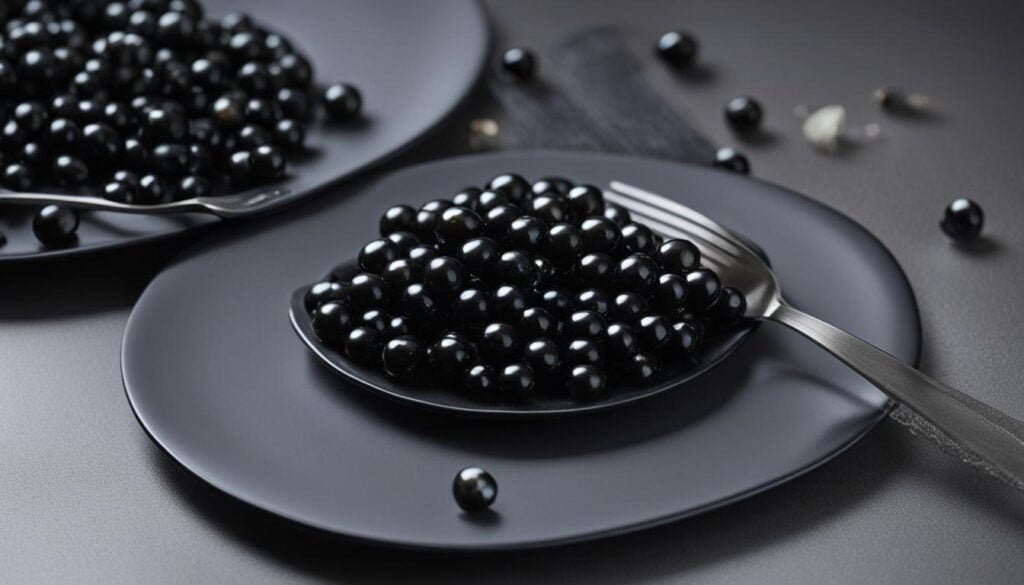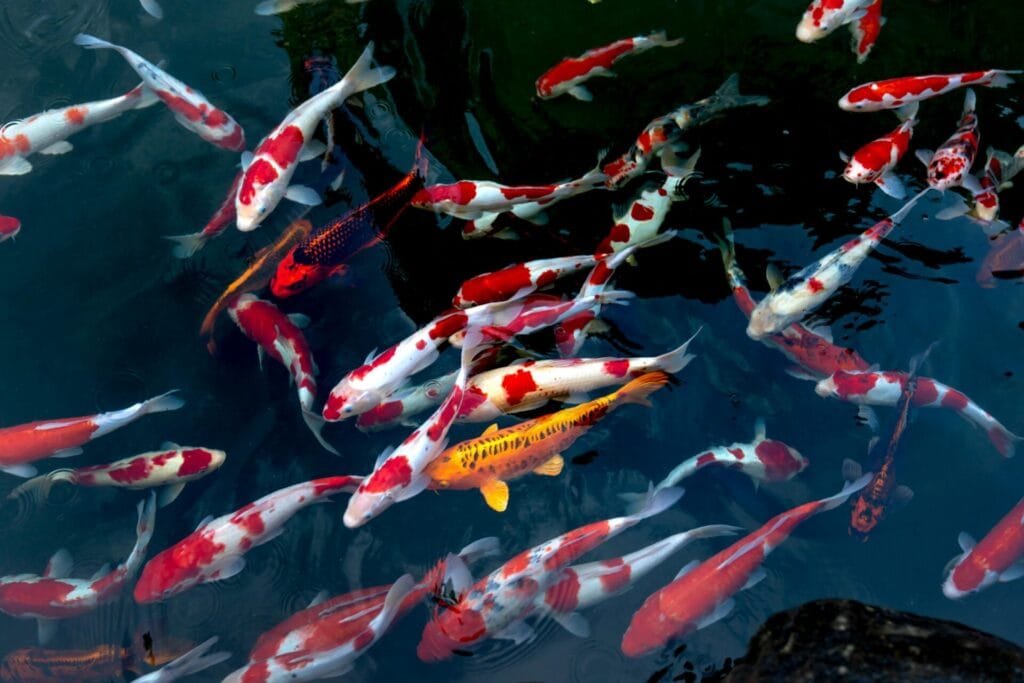Welcome to our exploration of the luxurious world of caviar! Caviar is known for its exquisite taste and unparalleled sophistication. But are all fish eggs considered caviar? Let’s delve into the fascinating realm of caviar and fish roe to uncover the secrets behind this prized delicacy.
Before we plunge into the depths of caviar, let’s clarify one thing: while caviar does indeed come from fish eggs, not all fish eggs can be classified as caviar. True caviar is exclusively derived from the delicate eggs of the sturgeon fish, adding to its rarity and allure.
Caviar’s production is a meticulous and labor-intensive process, involving expert harvesting and curing techniques. From Caspian Sea beluga caviar to Ossetra and Sevruga caviars, each type boasts its own distinct flavors and textures, captivating the palates of connoisseurs.
But caviar isn’t just about indulging in a luxurious treat. It also offers impressive nutritional benefits, showcasing a wealth of vitamins, minerals, and essential Omega-3 fatty acids. Moreover, it’s a versatile ingredient in various culinary creations, elevating dishes with its unique taste and elegant appearance.
As we journey through the history, flavors, and tasting experiences of caviar, we’ll uncover the secrets behind this sought-after delicacy. So, join us on this gastronomic adventure as we explore the world of caviar and fish roe, and unravel the mysteries of this exquisite indulgence!
Understanding the Difference: Caviar vs Roe
While the terms caviar and roe are often used interchangeably, there are distinct differences between the two. Fish eggs from any species can be classified as roe, whereas caviar specifically refers to the salt-cured and unfertilized eggs of the sturgeon family. Sturgeon fish, such as beluga, white sturgeon, and sevruga, are the prime producers of caviar. Caviar substitutes, made from different types of fish roe like salmon or trout roe, aim to replicate the texture of caviar but offer different taste profiles.
Understanding the distinction between caviar and roe is essential for appreciating the unique qualities and flavors they bring to the table.
Differences between Caviar and Roe
Here is a comparison between caviar and roe:
| Caviar | Roe |
|---|---|
| Specifically refers to salt-cured and unfertilized sturgeon eggs | Includes fish eggs from various species |
| Derived from sturgeon fish, such as beluga, white sturgeon, and sevruga | Can come from any fish species, including salmon, trout, and others |
| Has a unique texture, flavor, and complexity | Offers diverse textures and flavors depending on the fish species |
| Considered a luxury delicacy with a higher price point | Often more accessible and available at a lower price point |
As seen in the table above, caviar and roe each have their own distinctive characteristics, making them suitable for different culinary experiences. While caviar is renowned for its exclusivity and luxurious taste, roe provides a more accessible alternative with varying flavors and textures.
Exploring the Types of Caviar and Fish Roe
Caviar, the epitome of luxury, is available in a delightful array of varieties, each offering a unique flavor and texture. Let’s dive into the world of caviar and explore the remarkable range of flavors and options available!
Beluga Caviar
One of the most sought-after caviar varieties is Beluga Caviar, which hails from the pristine waters of the Caspian Sea. Known for its large, delicate eggs and a rich, buttery flavor, Beluga Caviar is a true indulgence. Its exquisite texture and velvety smoothness make it a favorite among caviar connoisseurs.
Ossetra Caviar
Another gem from the Caspian Sea region, Ossetra Caviar, captivates with its unique texture and flavor profile. With a range of colors, from deep amber to golden brown, and a nutty, slightly sweet taste, Ossetra Caviar offers a delightful sensory experience that is sure to please even the most discerning palates.
Sevruga Caviar
Sevruga Caviar, also sourced from the Caspian Sea, entices with its distinctive flavor and smaller-sized eggs. Known for its strong, assertive taste and delicate texture, Sevruga Caviar adds a touch of sophistication to any culinary creation. Its unique flavor profile sets it apart, making it a must-try for caviar aficionados.
Fish Roe Varieties
While caviar steals the spotlight, there is a plethora of fish roe options that showcase the diverse flavors and textures of the underwater world. Salmon roe, with its vibrant orange hue and delightful pop, brings a burst of freshness and adds a touch of color to dishes. On the other hand, trout roe offers a more subtle and nuanced flavor, allowing for a delicate balance of taste. And let’s not forget flying fish roe, commonly used in sushi, which offers a unique texture and flavor that elevates sushi rolls to the next level of culinary delight.
Now that we have explored the various types of caviar and fish roe, it’s time to indulge in these exquisite delicacies and experience the opulence they bring to the table!
The Taste Profile of Caviar and Roe
Caviar is often described as having a rich and complex taste with a subtle, nutty flavor that is both luxurious and satisfying. The texture of caviar varies depending on the type, with each variety offering a unique mouthfeel.
Fish roe, such as salmon and trout roe, offer a wide range of flavors, ranging from bold and briny to sweet and subtle. The texture of these eggs also varies, depending on whether they are considered roe or salt-cured to mimic the texture of caviar.
Both caviar and fish roe provide a culinary adventure for the palate, with their diverse flavors and textures. Whether you prefer the luxurious taste of caviar or the varied flavors of fish roe, there is something to delight every seafood enthusiast.
Comparing the Taste and Texture of Caviar and Fish Roe:
| Caviar | Fish Roe |
|---|---|
| Rich and complex taste | Wide range of flavors |
| Subtle, nutty flavor | Bold and briny to sweet and subtle |
| Varies by type | Varies by type |
| Delicate texture | Varied textures |
The Price of Caviar: Luxury Comes at a Cost
Caviar is considered an expensive delicacy due to several factors. The rarity and labor-intensive harvesting process of sturgeon eggs contribute to the high price of caviar. (caviar price, beluga caviar price, price of sturgeon caviar)
Beluga caviar, one of the most sought-after varieties, can fetch a premium price, especially if sourced from the Caspian Sea. Other types of caviar, like Ossetra and Sevruga, also command high prices due to their quality and scarcity. (expensive caviar)
Fish roe, such as salmon and trout roe, are generally more accessible and affordable alternatives to caviar. These types of fish roe provide a similar texture and flavor experience without the hefty price tag. (affordable fish roe)
However, regardless of the type, both caviar and fish roe should be handled with care to preserve their delicate nature.
Conclusion
In conclusion, caviar is indeed made of fish eggs, but not all fish eggs can be categorized as caviar. Caviar specifically refers to the salt-cured and unfertilized eggs of the sturgeon fish. It is a highly luxurious delicacy, renowned for its rich taste, complex flavors, and delicate texture.
While caviar is considered expensive due to its rarity and labor-intensive production process, there are alternative options available for those who want to experience the taste and texture of fish roe without the high price tag. Fish roe, such as salmon and trout roe, provide a similar tasting experience with a more accessible price point.
Regardless of the type, whether it be the luxurious caviar or the more affordable fish roe, both offer a unique gastronomic experience. From their historical significance to their nutritional benefits, caviar and fish roe add a touch of luxury and flavor to various culinary creations. Whether you’re tasting caviar for the first time or exploring the different types of fish roe, one thing is certain – their exquisite flavors will leave a lasting impression on your palate.


